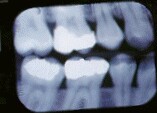 |
 |
 |

Dental Implants Need More Work Than Root Canals
Review suggests preserving natural teeth should be top priority for patients, clinicians|
|
HealthDay
By Robert Preidt
Thursday, November 20, 2008
 THURSDAY, Nov. 20 (HealthDay News) -- Dental implants require much more follow-up treatment than root canals, according to a study by researchers at the University of Alabama at Birmingham.
THURSDAY, Nov. 20 (HealthDay News) -- Dental implants require much more follow-up treatment than root canals, according to a study by researchers at the University of Alabama at Birmingham.
The findings suggest that every effort should be made to preserve natural teeth before considering implants.
The researchers examined the charts of a group of patients who received a total of 129 dental implants and a group of patients who received 143 root canals. The follow-up ranged from 15 to 57 months (average of 36 months) for the dental implants and 18 to 59 months (average of 22 months) for the root canals.
The success rate for the dental implants was 98.4 percent; for root canals it was 99.3 percent. However, 12.4 percent of the dental implants required additional interventions, compared with 1.4 percent of the root canals.
The findings were published in the November issue of the Journal of Endodontics.
"Many dental professionals today are faced with the dilemma of whether root canal treatment or dental implants are the best option for their patients," lead investigator Dr. James Porter Hannahan, of the University of Alabama at Birmingham, said in an American Association of Endodontists (AAE) news release. "While the success of both procedures is similar, saving the natural tooth through a root canal rarely requires follow-up treatment and generally lasts a lifetime; implants, on the other hand, have more post-operative complications and higher long-term failure rates."
Research has shown that poor oral health and tooth loss may be associated with serious health problems such as heart disease, stroke, diabetes and even certain types of cancer.
"Considering these (study) results in light of the growing body of evidence on the impact of oral health on overall health, it is imperative for dental professionals to partner with endodontists who have advanced training in examining whether a natural tooth can be saved through root canal treatment," AAE President Dr. Louis Rossman said in the news release. "While implants may be an appropriate solution for people with missing teeth, endodontic treatment should be the first choice for restoring a compromised tooth."
In root canal, the inflamed pulp that's causing pain is removed, and the inside of the tooth is cleaned, filled and sealed. Most root canals can be completed in one visit. Each year in the United States, root canals restore and save about 17 million teeth. In dental implants, the tooth is extracted, a metal post is inserted in the jaw, and a porcelain crown is attached to the post. An implant can require three or more visits over the course of several months, according to the AAE.
HealthDay
Copyright (c) 2008 ScoutNews, LLC. All rights reserved.
More News on this Date
Related MedlinePlus Pages:
| Home | Health Topics | Drugs & Supplements | Encyclopedia | Dictionary | News | Directories | Other Resources | |
| Disclaimers | Copyright | Privacy | Accessibility | Quality Guidelines U.S. National Library of Medicine, 8600 Rockville Pike, Bethesda, MD 20894 National Institutes of Health | Department of Health & Human Services |
Date last updated: 21 November 2008 |




